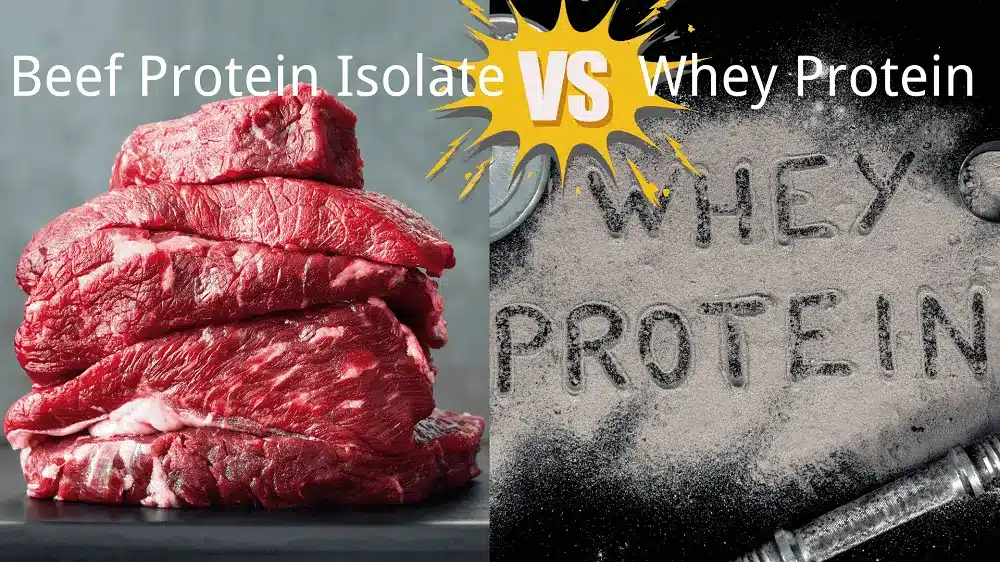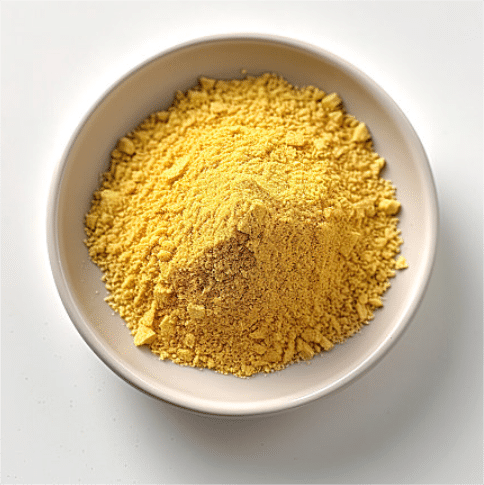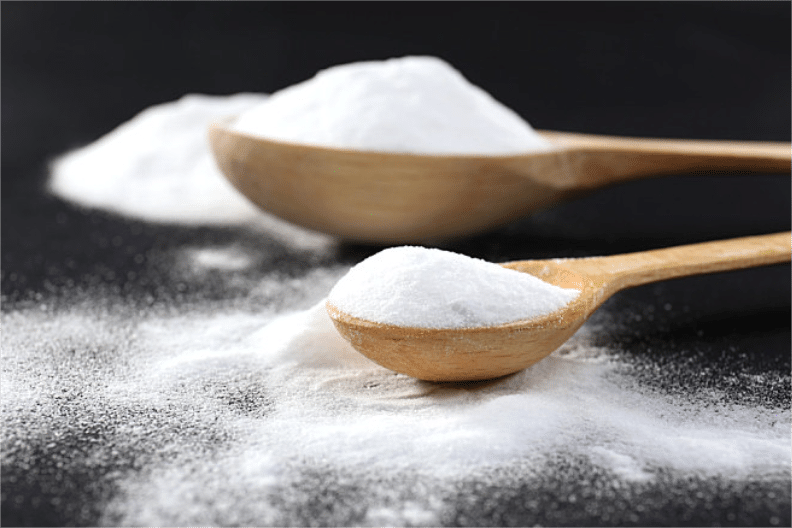Protein supplements are a staple in the fitness and nutrition world, helping people meet their protein needs for muscle growth, recovery, and overall health. Among the many options available, Beef Protein Isolate vs Whey Protein stands out as a common comparison for those seeking high-quality protein sources. Both are derived from animal sources but differ in their composition, benefits, and ideal use cases. This article dives deep into the differences between Beef Protein Isolate and Whey Protein, offering insights to help you decide which is best for your goals.
What is Beef Protein Isolate?
Beef Protein Isolate is a protein powder made from beef, typically extracted from lean cuts or collagen-rich parts like bones and connective tissues. The production process involves hydrolyzing and isolating the protein to create a concentrated powder with minimal fat and carbohydrates. It typically contains 25–30 grams of protein per serving and a complete amino acid profile, including essential amino acids like leucine, valine, and isoleucine.
This protein is popular among those following paleo or dairy-free diets because it avoids common allergens like lactose. It’s also marketed for its high bioavailability, meaning the body can efficiently absorb and use the protein. Beef Protein Isolate is often used by athletes for muscle recovery or by individuals seeking a protein source aligned with specific dietary preferences.

What is Whey Protein?
Whey Protein comes from milk, a byproduct of the cheese-making process. It’s available in three main forms: concentrate, isolate, and hydrolysate. Whey concentrate contains 70–80% protein with some lactose and fat, while whey isolate is over 90% protein with minimal lactose. Hydrolysate is pre-digested for faster absorption. A typical serving provides 20–25 grams of protein and a robust amino acid profile, particularly rich in leucine, a key driver of muscle protein synthesis.
Whey is the gold standard in protein supplements due to its extensive research, affordability, and versatility. It’s widely used for post-workout recovery, muscle building, and even as a meal replacement for weight management.
Key Differences Between Beef Protein Isolate and Whey Protein
To help you understand the distinctions, let’s break down the key factors that set Beef Protein Isolate and Whey Protein apart.
Source and Processing
Beef Protein Isolate is sourced from bovine tissue, often processed to remove fats and impurities, resulting in a pure protein powder. Some brands incorporate collagen peptides, which may lower the essential amino acid content compared to muscle-derived beef protein. Whey Protein, on the other hand, is derived from milk, filtered to separate protein from lactose and fat. The processing of whey isolate or hydrolysate makes it nearly lactose-free, appealing to those with mild lactose sensitivity.
Nutritional Composition
Both proteins offer high protein content, but their amino acid profiles differ slightly. Whey Protein is particularly high in leucine (about 2.5–3 grams per serving), which is critical for muscle growth. Beef Protein Isolate provides a complete amino acid profile but may have lower leucine levels (around 1.8–2.2 grams per serving). Beef protein often contains collagen-derived amino acids like glycine and proline, beneficial for joint and skin health but less effective for muscle synthesis.
Whey Protein may contain small amounts of lactose (in concentrate form) and micronutrients like calcium, while Beef Protein Isolate is typically free of lactose and may include trace minerals from beef.
Digestibility and Absorption
Whey Protein is known for its fast digestion, with whey hydrolysate being the quickest, making it ideal for post-workout use. Beef Protein Isolate is also highly bioavailable but may digest slightly slower due to its collagen content. For those with lactose intolerance, Beef Protein Isolate is a safer choice, as even whey isolate can cause issues for highly sensitive individuals.
Taste and Texture
Whey Protein comes in a variety of flavors, from chocolate to vanilla, and generally mixes well with water or milk, creating a smooth texture. Beef Protein Isolate, however, can have a distinct, sometimes meaty taste that not all users enjoy. Its texture may be grainier, especially if collagen-based, and it often requires more effort to mix smoothly.
Price and Accessibility
Whey Protein is more affordable, with prices ranging from $0.80 to $1.50 per serving, depending on the brand and type (concentrate vs. isolate). Beef Protein Isolate is typically pricier, costing $1.50–$2.50 per serving due to its specialized processing. Whey is widely available in stores and online, while Beef Protein Isolate is less common but growing in popularity.
Comparison Table
| Feature | Beef Protein Isolate | Whey Protein |
|---|---|---|
| Source | Beef (lean cuts or collagen) | Milk (byproduct of cheese-making) |
| Protein per Serving | 25–30g | 20–25g |
| Leucine Content | ~1.8–2.2g | ~2.5–3g |
| Lactose Content | None | Low (isolate) to moderate (concentrate) |
| Digestion Speed | Moderate to fast | Fast (especially hydrolysate) |
| Price per Serving | $1.50–$2.50 | $0.80–$1.50 |
| Taste | Meaty, sometimes less palatable | Smooth, variety of flavors |
| Best For | Dairy-free, paleo diets | Muscle building, affordability |
Benefits and Drawbacks
Beef Protein Isolate
Benefits:
- Lactose-Free: Ideal for those with dairy allergies or lactose intolerance.
- Paleo-Friendly: Aligns with diets emphasizing whole, animal-based foods.
- Collagen Content: Supports joint, skin, and connective tissue health.
- High Bioavailability: Easily absorbed for muscle repair and growth.
Drawbacks:
- Limited Research: Less studied than whey, so long-term effects are less clear.
- Taste Concerns: Some users find the flavor off-putting.
- Higher Cost: More expensive per serving compared to whey.
Whey Protein
Benefits:
- Extensively Researched: Decades of studies support its efficacy for muscle growth and recovery.
- Cost-Effective: One of the most affordable protein supplements.
- Versatile: Available in various forms and flavors for different needs.
- High Leucine Content: Optimal for stimulating muscle protein synthesis.
Drawbacks:
- Lactose Issues: Can cause digestive discomfort for lactose-intolerant individuals.
- Allergen Potential: Milk-derived, so not suitable for those with dairy allergies.
Who Should Choose Which?
Choosing between Beef Protein Isolate and Whey Protein depends on your dietary needs, fitness goals, and preferences.
- Choose Beef Protein Isolate if:
- You have lactose intolerance or dairy allergies.
- You follow a paleo or dairy-free diet.
- You want a protein source with potential joint and skin health benefits.
- You’re willing to pay a premium for a specialized product.
- Choose Whey Protein if:
- You’re focused on muscle building and want a leucine-rich protein.
- You’re on a budget and need a cost-effective option.
- You prefer a wide variety of flavors and smooth texture.
- You have no issues with dairy or lactose.
For specific goals:
- Muscle Gain: Whey Protein is the better choice due to its higher leucine content and extensive research backing its effectiveness.
- Weight Loss: Both can work as low-calorie, high-protein options, but whey’s affordability makes it more practical for daily use.
- General Health: Beef Protein Isolate may offer added benefits for joint and skin health due to its collagen content.
Practical Tips for Using Protein Supplements
To get the most out of either protein, consider these tips:
- Timing: Consume 20–30 grams of protein within 1–2 hours post-workout to maximize muscle recovery. Both proteins work well here, though whey’s faster absorption may give it a slight edge.
- Mixing: Blend with water, milk (for whey), or non-dairy alternatives like almond milk. Add fruits, nut butters, or oats for a nutrient-dense smoothie.
- Daily Intake: Aim for 0.8–1.2 grams of protein per pound of body weight daily, depending on activity level. Use supplements to fill gaps in whole-food protein intake.
- Combination: Pair with carbohydrates (e.g., a banana) post-workout to enhance glycogen replenishment, or with healthy fats (e.g., avocado) for a balanced meal replacement.
Conclusion
Beef Protein Isolate and Whey Protein are both excellent protein supplements, but they cater to different needs. Beef Protein Isolate is a great choice for those avoiding dairy or following paleo diets, offering unique benefits like collagen for joint health. Whey Protein, however, remains the go-to for its affordability, leucine content, and extensive research supporting muscle growth. Consider your dietary restrictions, fitness goals, and budget when choosing. Try a small sample of each to see which suits your taste and lifestyle, and consult a nutritionist for personalized advice. Which protein are you leaning toward? Share your thoughts or experiences below!
Is whey protein or beef isolate better?
Neither is universally “better”; it depends on your needs. Whey Protein is better for muscle building due to its higher leucine content (2.5–3g per serving vs. 1.8–2.2g for beef) and extensive research supporting its efficacy. It’s also more affordable ($0.80–$1.50/serving). Beef Protein Isolate is better for those with dairy allergies, lactose intolerance, or following paleo diets, and it may support joint health due to collagen content. Choose based on dietary restrictions, goals, and budget.
Is beef protein isolate worth it?
Beef Protein Isolate is worth it if you need a dairy-free, paleo-friendly protein with potential joint health benefits. However, it’s pricier ($1.50–$2.50/serving), has a less palatable taste for some, and has less research than whey. If muscle gain is your primary goal and you tolerate dairy, whey is often a better value.
What is a beef protein isolate?
Beef Protein Isolate is a protein powder derived from beef, typically lean cuts or collagen-rich parts like bones and connective tissues. It’s processed through hydrolysis and filtration to create a concentrated powder with 25–30g of protein per serving, minimal fat, and no lactose. It’s used for muscle recovery and fits dairy-free or paleo diets.
Does beef protein isolate contain creatine?
Beef Protein Isolate typically does not contain significant creatine unless explicitly added by the manufacturer. Creatine is naturally found in muscle tissue, but the processing of beef protein isolate often removes it. Check product labels for added creatine. (Source: General industry knowledge; no specific study cited.)
Does beef protein powder spike insulin?
Beef Protein Isolate has a moderate insulin response, similar to other protein sources, due to its amino acid content (e.g., leucine, arginine). It may spike insulin less than whey, which has a faster absorption rate and higher leucine content, but the difference is minimal. Data is limited, but studies suggest protein-induced insulin spikes are generally mild compared to carbohydrates.
Is beef isolate inflammatory?
Beef Protein Isolate is not inherently inflammatory. Its collagen-derived amino acids (glycine, proline) may even have anti-inflammatory benefits for joints and connective tissues. However, individual responses vary, and low-quality products with additives could cause issues. Choose high-quality, minimally processed brands.
Sources
- Sharp, M. H., et al. (2015). Effects of beef and whey protein on lean mass and strength. https://www.ncbi.nlm.nih.gov/pmc/articles/PMC4595383/
- Detzel, C., et al. (2016). Amino acid composition and postprandial response of beef and whey. https://www.researchgate.net/publication/346092824
- Gorissen, S. H., et al. (2018). Protein content and amino acid composition. https://www.ncbi.nlm.nih.gov/pmc/articles/PMC6245118/
- Naclerio, F., et al. (2019). Beef protein supplementation and body composition. https://www.ncbi.nlm.nih.gov/pmc/articles/PMC6651698/
- Schaafsma, G. (2000). Protein digestibility-corrected amino acid score. https://academic.oup.com/jn/article/130/7/1865S/4686203



